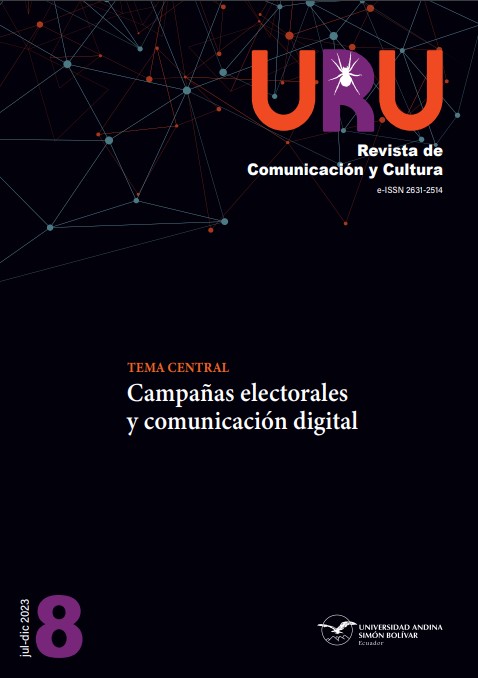The Digital Route in the Government of Guillermo Lasso: An Analysis Based on Social Networks and Communication Strategies
DOI:
https://doi.org/10.32719/26312514.2023.8.2Keywords:
Social networks, communication strategies, Facebook, Twitter, TikTok, Ecuadorian presidency, Guillermo LassoAbstract
This study analyzes the presence or absence of communication strategies managed in the informative publications of Guillermo Lasso, president of the Republic of Ecuador, from a qualitative approach and a non-probabilistic sampling, a semi-structured interview was conducted with the communication secretary of the presidency between the period 2015 to 2017, and is counteracted with a multimodal matrix to determine the interactions, visual elements and messages published on the social networks of: facebook, Twitter and TikTok, with more than 450 publications analyzed in total, it is evident how the president maintains a business and family discourse, relegating the important aspects that the president of a country must consider, since it does not manage to set a trend but it does become a follower of the conjunctures.
Downloads
References
Alonso, Laura, Susana Miquel y Andreu Casero. 2016. “Un potencial comunicativo desaprovechado: Twitter como mecanismo generador de diálogo en campaña electoral.” Obra Digital 11: 39-59. https://doi.org/10.25029/od.2016.100.11. DOI: https://doi.org/10.25029/od.2016.100.11
Alvarado, Lusmidia, y Margarita García. 2008. “Características más relevantes del paradigma sociocrítico: Su aplicación en investigaciones de educación ambiental y de enseñanza de las ciencias realizadas en el Doctorado de Educación del Instituto Pedagógico de Caracas”. Sapiens. Revista Universitaria de Investigación 9 (2): 187-202. https://bit.ly/3Ngqe0v.
BBC. 2019. “Crisis en Ecuador: Lenín Moreno vs. Rafael Correa, los antiguos aliados cuya enemistad divide al país”. BBC. 10 de octubre. https://bbc.in/3HdRhFK.
—. 2021. “Elecciones en Ecuador: Pérez y Lasso acuerdan un recuento parcial de votos que definirá quién será el rival de Arauz en segunda vuelta”. BBC. 13 de febrero. https://bbc.in/3NgqpJd.
Camacho, Verónica. 2021. “TikTok como herramienta de comunicación política: Una mirada a las elecciones presidenciales en Ecuador 2021”. Tesis de maestría, Universidad Oberta de Catalunya, España. https://bit.ly/3oM2EyF.
Deltell, Luis, Florencia Claes y José Miguel Osteso. 2013. “Predicción de tendencia política por Twitter: Elecciones andaluzas 2012”. Ámbitos. Revista Internacional de Comunicación 22. https://bit.ly/3HfXiC4.
EC CNE. 2017. Resultados electorales: Elecciones 2017. Quito: CNE. https://bit.ly/3HhiGa5.
Ecuavisa. 2017. “Recuento ratifica como ganador al binomio Lenín Moreno-Jorge Glas”. Ecuavisa. 18 de abril. https://bit.ly/424rhox.
El Comercio. 2012. “Auki Tituaña ya no es vicepresidencial de Guillermo Lasso”. El Comercio. 12 de noviembre. https://bit.ly/3oF2CZb.
Gerl, Katharina. 2017. “Política 2.0: Internet y el trabajo de los partidos”. Nueva Sociedad 269: 61-5.
Iturralde, Jessyca. 2018. “Redes sociales y la política en Ecuador. Caso: Páginas de Facebook ‘Fuera, Correa, Fuera’ y ‘Yo Apoyo a Rafael Correa’. Período enero-mayo 2017”. Tesis de licenciatura, Universidad Central del Ecuador. https://bit.ly/3L7PC5S.
Jiménez, Bernardo. 2000. “Investigación cualitativa y psicología social crítica: Contra la lógica binaria y la ilusión de la pureza”. Revista Universidad de Guadalajara 17.
Jivkova, Dimitrina, Paula Requeijo y Graciela Padilla. 2017. “Usos y tendencias de Twitter en la campaña a elecciones generales españolas del 20D de 2015: Hashtags que fueron trending topic”. Profesional de La Información 26 (5): 824-37. https://doi.org/10.3145/epi.2017.sep.05. DOI: https://doi.org/10.3145/epi.2017.sep.05
Lobo, Sascha. 2017. “Cómo influyen las redes sociales en las elecciones”. Nueva Sociedad 269: 40-44. https://bit.ly/420v71P.
López, Mónica. 2012. “Twitter como instrumento de comunicación política en campaña: Elecciones generales de 2011”. Cuadernos de Gestión de Información 2: 69-84. https://bit.ly/3LxvviW.
Marín, Isidro, María Isabel Punin, Mónica Hinojosa y Javier Ruiz. 2016. “Twitter como herramienta estratégica en la política ecuatoriana”. Razón y Palabra 20 (93): 120-34. https://bit.ly/421R9kG.
Montúfar, César. 2011. “Rafael Correa y su refundación constituyente: Análisis de la primera fase de la Revolución Ciudadana 2007-2010”. Informe de investigación, Universidad Andina Simón Bolívar, Sede Ecuador. https://bit.ly/3V6FNd8.
Obando, Vladimir. 2021. “El efecto TikTok: Plataformas digitales y reconfiguración del escenario político electoral en Ecuador”. Sociología y Política Hoy 5: 175-84. https://bit.ly/3V5w2vL.
O’Halloran, Kay. 2016. “Análisis del discurso multimodal”. Revista Latinoamericana de Estudios del Discurso 12 (1): 75-97. https://bit.ly/40VJNyx. DOI: https://doi.org/10.35956/v.12.n1.2012.p.75-97
Rodríguez, Claudia, y Judith Silva. 2018. “Política 2.0: Facebook como herramienta de la campaña. Estudio de caso elecciones generales de Ecuador 2017”. En Poder y medios en las sociedades del siglo XXI, editado por María José Pérez, Gema Alcolea y Antonia Nogales, 63-85. Madrid: Egregius. https://bit.ly/445qjtJ.
Rodríguez, Roberto, y Daniel Ureña. 2011. “Diez razones para el uso de Twitter como herramienta en la comunicación política y electoral”. Comunicación y Pluralismo 10: 89-116. https://bit.ly/3HgEnqz. DOI: https://doi.org/10.36576/summa.30573
Romero, Daniel. 2017. “Andrés Páez llama a sus seguidores para sumar gente frente al CNE a la espera de los resultados”. El Comercio. 20 de febrero. https://bit.ly/44i638H.
Rosanvallon, Pierre. 2017. “La democracia del siglo XXI”. Nueva Sociedad 269. https://bit.ly/44i6aB9.
Russo, Alexander. 2020. “Cómo funcionan los algoritmos de Facebook, Instagram y Twitter”. RD Station. 26 de agosto. https://bit.ly/3MH7W7W.
Sarasqueta, Gonzalo. 2021. “Técnicas de la comunicación política ante la era de la infoxicación y la interrupción: Del storytelling al storydoing”. Comunicación y Hombre 17: 73-84. https://doi.org/10.32466/eufv-cyh.2021.17.648.73-84. DOI: https://doi.org/10.32466/eufv-cyh.2021.17.648.73-84
Vásquez, Isabel. 2005. “Tipos de estudio y métodos de investigación”. Gestiópolis. 18 de diciembre. https://bit.ly/2E71i8M.
Downloads
Published
How to Cite
Issue
Section
License

This work is licensed under a Creative Commons Attribution-NonCommercial-ShareAlike 4.0 International License.
ASSIGNMENT OF RIGHTS, DECLARATION OF CONFLICT OF INTEREST AND DISSEMINATION
The authors who publish in this journal accept the following conditions:
- Authors retain copyright and grant the journal the right of first publication, with the work registered under the Creative Commons Attribution-NonCommercial-ShareAlike 4.0 License, which allows sharing, adapting and attributing the work (see: Open Access Policies).
- Authors can make other independent and additional contractual agreements for the distribution of the article published in this journal (e.g., include it in an institutional repository or publish it in a book) as long as they expressly indicate that the article was published for the first time in Uru: Revista de Comunicación y Cultura. In the case of reproduction, a note similar to the following must be included: This text was originally published in the journal Uru: Revista de Comunicación y Cultura N ° -, year of publication.
- Authors are encouraged to publish their work on the Internet (e.g. on institutional or personal pages) in the final version published by Uru: Revista de Comunicaicón y Cultura as it may lead to a wider and faster dissemination of the published work.









